Is competitiveness the solution?
31 July 2023
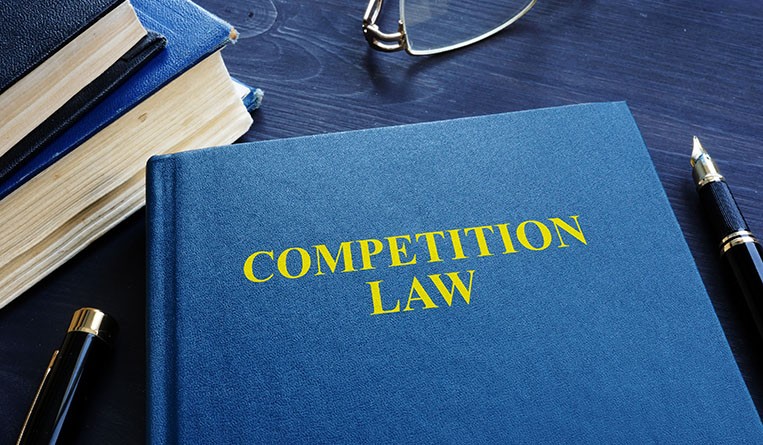
During the 1970s, antitrust law and policy significantly advanced. The infamous “Nine No-Nos” of that decade, according to many, lacked both a strong economic foundation and an adequate understanding of the incentives for innovation that intellectual property and intellectual property licensing might offer. The law in this field has improved due to economic and legal studies, much like other antitrust law topics, and is now much more in line with the public interest.
Antitrust law recognized that policy should follow the current state of the law and economic knowledge in the 1995 Federal Trade Commission and Department of Justice Antitrust Guidelines for the Licensing of Intellectual Property. The guidelines, published by the United States government, offered a fair perspective on how to apply antitrust legislation to actions concerning IP licensing.
While Hong Kong has a Competition Ordinance, it is not intended to prevent the protection of IP rights. However, it has a balancing effect on how agreements relating to the use, or restriction of use, of IP rights can be entered into and enforced in Hong Kong.
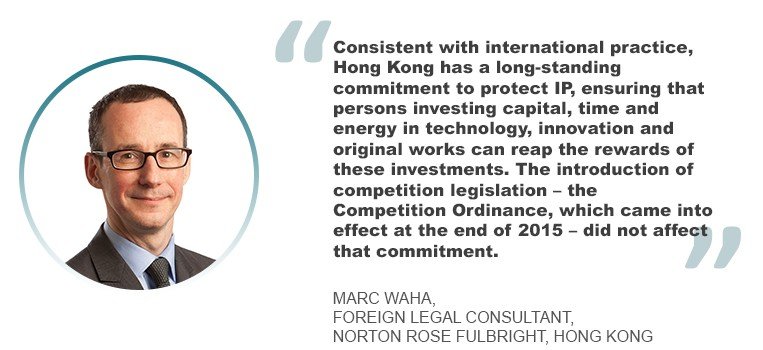
“Consistent with international practice, Hong Kong has a long-standing commitment to protect IP, ensuring that persons investing capital, time and energy in technology, innovation and original works can reap the rewards of these investments,” said Marc Waha, a foreign legal consultant who heads the antitrust and competition practice at Norton Rose Fulbright in Hong Kong. “The introduction of competition legislation – the Competition Ordinance, which came into effect at the end of 2015 – did not affect that commitment. The policies underpinning the Competition Ordinance are largely consistent with those at the heart of IP rights, which is to foster innovation.”
He added that while IP law and competition law in Hong Kong are largely consistent, IP rights holders will face constraints under the Competition Ordinance, where they have significant market power. Like property rights, competition legislation does not remove legitimate rights from their holders but introduces limits to these rights where the holder has a significant market position, according to Waha.
“Competition legislation in Hong Kong is still new. To our knowledge, there has not yet been any case where the Competition Commission or the courts relied on the Competition Ordinance to limit the exercise of IP rights,” he said. “However, it is entirely conceivable that, consistent with the approach in the EU or the PRC, the exercise of IP rights would be curtailed where this constitutes an abuse of market power. Examples would include a refusal to license by the holder of a patent over technology essential to compete in some markets.”
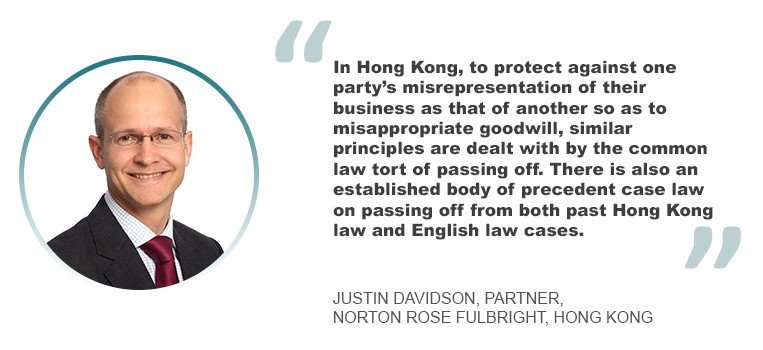
With unfair competition not being dealt with as a separate identified legal right in Hong Kong, Justin Davidson, a partner at Norton Rose Fulbright in Hong Kong, said this is unlike in the PRC, which has specific Unfair Competition legislation.
“In Hong Kong, to protect against one party’s misrepresentation of their business as that of another so as to misappropriate goodwill, similar principles are dealt with by the common law tort of passing off,” he said. “There is also an established body of precedent case law on passing off, from both past Hong Kong law and English law cases, that addresses such concerns about parties unfairly competing with one another and suffering damage through the misappropriation of goodwill, even where the trademarks of the other may not have been used.”
Complementary to one another
Meanwhile, Cambodia was the last ASEAN member country to adopt a law relating to competition. The competition law came into force on October 6, 2021, and its main objectives are to encourage fair and honest market practices, increase economic growth and help consumers access high-quality goods and services at a reasonable price.
Cambodia’s competition law applies to everyone conducting business activities or supporting business activities that prevent, restrict or distort competition in a market, regardless of whether the activities are conducted inside or outside the country. It addresses three main restrictive business practices – anti-competitive practices (horizontal agreements and vertical agreements), abuse of a dominant position and anti-competitive business combinations – and some exemptions from the above prohibitions. Further, the law outlines the mechanisms for enforcement and the penalties for violation.
In addition to the competition law, IP rights in Cambodia are protected under the following laws:
- Law concerning Marks, Trade Names and Acts of Unfair Competition. This law protects trademarks and trade names registered in Cambodia and prevents acts of unfair competition.
- Law on Copyright and Related Rights. This law protects works of authors, works of performers, phonograms, and broadcasts through broadcasting organizations in Cambodia.
- Law on Patents, Utility Model Certificates and Industrial Designs. This law provides protection for patents, utility models and industrial designs in Cambodia.
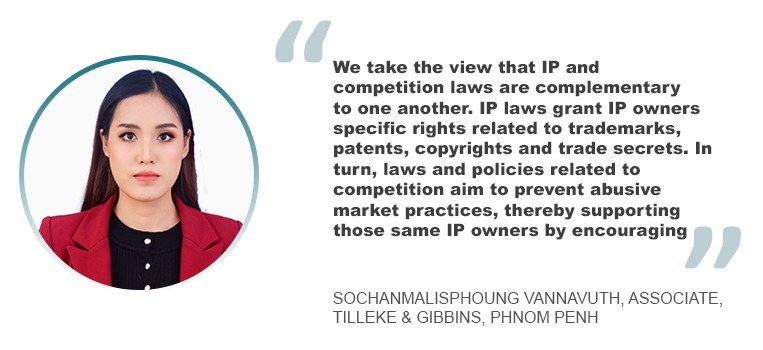
“We take the view that IP and competition laws are complementary to one another,” said Sochanmalisphoung Vannavuth, an associate at Tilleke & Gibbins in Phnom Penh. “IP laws grant IP owners specific rights related to trademarks, patents, copyrights and trade secrets. In turn, laws and policies related to competition aim to prevent abusive market practices, thereby supporting those same IP owners by encouraging fair business practices.”
She added that IP rights holders could depend on competition laws to prevent market manipulation by competitors through anti-competitive practices, such as price fixing, dumping and other similar acts. She said that “strong enforcement of both IP and competition laws can create a healthy and stable business environment, which may spur innovation and economic growth.”
Unfair competition and antitrust law
In Cambodia, unfair competition as it relates to IP is governed by the Law concerning Marks, Trade Names and Acts of Unfair Competition (Trademark and Unfair Competition Law). Under the Trademark and Unfair Competition Law, any act of competition contrary to honest practices in industrial, commercial or service matters is considered unfair competition. Article 23 of the Trademark and Unfair Competition Law prohibits three specific types of acts:
- All acts that create confusion by any means with the enterprise, the goods or the services of a competitor;
- False allegations in the course of trade that discredit the enterprise, the goods or the services of a competitor; and
- Indications or allegations that are liable to mislead the public as to the nature, the manufacturing process, the characteristics, the suitability, or the quantity of goods or services.
“The Trademark and Unfair Competition Law also imposes penalties on those who commit acts of unfair competition under this law,” said Vongkhim Lay, an associate at Tilleke & Gibbins in Phnom Penh. “Violators may be penalized with a fine of CR5 to CR10 million (US$1,200 to US$2,400), imprisonment from one month to one year, or both. The Cambodian Trademark and Unfair Competition Law aids in protecting intellectual, economic and creative ideas and investments made by business owners. The law helps deter businesses from stealing competitors’ ideas and promotes fair and healthy competition among businesses to offer better goods and services.”
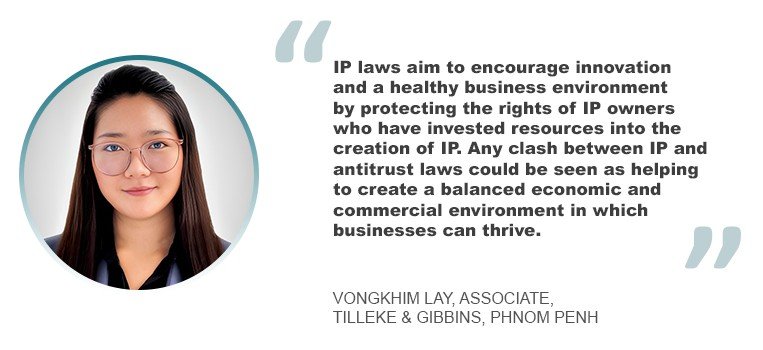
The antitrust law is generally viewed as a mechanism to ensure fair business competition in the market. This encourages businesses to invest in the development of new goods and services, work to improve the quality of existing goods and services and keep prices low to compete in the marketplace, thus resulting in the promotion of innovation and creativity.
“Similarly, IP laws aim to encourage innovation and a healthy business environment by protecting the rights of IP owners who have invested resources into the creation of IP. Any clash between IP and antitrust laws could be seen as helping to create a balanced economic and commercial environment in which businesses can thrive,” she said.
She added that while IP rights protect innovation by providing rights to owners, competition law or competition policy prevents certain unfair business practices. Nevertheless, the existence of a competition law or policy is only a partial solution to preventing IP rights from abuse or making markets competitive.
“Other effective solutions include strong IP enforcement policies (provision of training, advocacy and technical assistance in the field of IP enforcement), and strong government support for innovation, such as provision of financial support for R&D or tax incentives for R&D,” she said.
- Excel V. Dyquiangco






